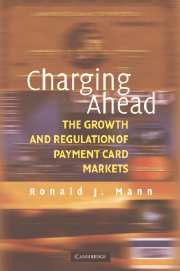Book contents
- Frontmatter
- Contents
- Figures and Tables
- Acknowledgments
- Introduction
- PART I THE BASICS OF PAYMENT CARDS
- PART II EASY MONEY
- PART III THE PUZZLE OF PAYMENT CARDS
- 6 Explaining the Pattern of Global Card Use
- 7 The Introduction of the Payment Card
- 8 Revolving Credit
- 9 Point-of-Sale Debit
- 10 Convergence and Exceptionalism in the Use of Cards
- PART IV REFORMING PAYMENT SYSTEMS
- PART V OPTIMIZING CONSUMER CREDIT MARKETS AND BANKRUPTCY POLICY
- Conclusion
- Appendix: Country-Level Data
- Notes
- Bibliography
- Index
10 - Convergence and Exceptionalism in the Use of Cards
Published online by Cambridge University Press: 06 July 2010
- Frontmatter
- Contents
- Figures and Tables
- Acknowledgments
- Introduction
- PART I THE BASICS OF PAYMENT CARDS
- PART II EASY MONEY
- PART III THE PUZZLE OF PAYMENT CARDS
- 6 Explaining the Pattern of Global Card Use
- 7 The Introduction of the Payment Card
- 8 Revolving Credit
- 9 Point-of-Sale Debit
- 10 Convergence and Exceptionalism in the Use of Cards
- PART IV REFORMING PAYMENT SYSTEMS
- PART V OPTIMIZING CONSUMER CREDIT MARKETS AND BANKRUPTCY POLICY
- Conclusion
- Appendix: Country-Level Data
- Notes
- Bibliography
- Index
Summary
In the final two parts of the book, I discuss various proposals designed to address concerns about the relations among spending, debt, and financial distress, focusing both on the risk associated with the credit card as a payment device and the risk associated with using the credit card to borrow. Before turning to the proposals, this chapter considers whether the levels of spending and debt in U.S. card markets are likely to spread to foreign markets through the credit card.
Geographic card markets fall into one of two patterns. The first is the free market global response. Exemplified by Australia, Canada, and the United Kingdom, card markets are characterized by an increasingly dominant use of payment cards, but with a substantially lower use of credit cards and credit card borrowing than the United States. The path dependence explanation discussed in earlier chapters suggests that the markets in Australia, Canada, and the United Kingdom maintain more segmentation between the credit card and other payment products than the market in the United States.
The second is the pattern evidenced by countries like Japan and the continental European Union that limit access to consumer data, making it difficult for modern credit card products to develop. The basic thesis, familiar to any reader of the literature on globalization, is that standardized products that are more effective than local variants will dominate markets absent some important obstacle to convergence on the global norm.
- Type
- Chapter
- Information
- Charging AheadThe Growth and Regulation of Payment Card Markets around the World, pp. 106 - 118Publisher: Cambridge University PressPrint publication year: 2006

